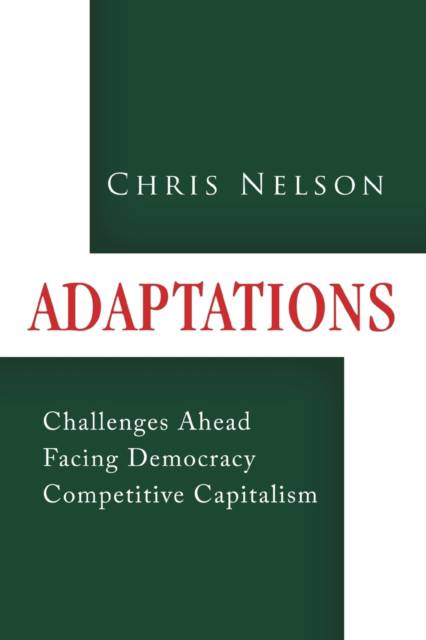
- Retrait gratuit dans votre magasin Club
- 7.000.000 titres dans notre catalogue
- Payer en toute sécurité
- Toujours un magasin près de chez vous
- Retrait gratuit dans votre magasin Club
- 7.000.0000 titres dans notre catalogue
- Payer en toute sécurité
- Toujours un magasin près de chez vous
Adaptations
Challenges Ahead Facing Democracy Competitive Capitalism
Chris Nelson
Livre broché | Anglais
22,45 €
+ 44 points
Description
This short book leads the reader on a 'guided tour' of some of the great issues facing us in the 21st century, and differing views of the best way to adapt to them. Issues relating to global warming climate change and how to respond//issues relating to the environmental limits to growth and how to respond/displacement of workers by automation and how what to do/the high and rising debt ratios of governments and whether to tax the rich the same as everybody else/ differing views on the role of and need for regulation/differing views on the nature and role of democratic government (whether well run or synonymous with inefficiency, corruption, and waste as the purveyors of Reaganomics are still pushing on us 30 years onwards. Pride of place among these issues must probably be given to the issue of how best to manage (i.e. slow down) climate change. This book puts forward two original approaches for dealing with the problem, which mightt be considerably cheaper and more easy to apply than a full scale energy transition to renewables by the whole of the economy, especially the industrial part of it. In my humble opinion, all that is required to begin the meet the challenge of climate change is that "people of good will" be prepared to make sacrifices for the benefit of the whole of society in meeting this challenge. My approach may be applied singly or in combination as follows: - Respecting the limits to growth - giving workers/employees more time off from work/more leisure time/ instead of having them produce more material goods with their inevitable by-products of greenhouse gases emissions/pollution. - Hastening the movement towards a non-polluting post industrial information and service economy - accelerating and re-inforcing existing/underlying trends in the economy away from polluting goods producing industries towards non polluting labour intensive and also skill intensive services providing. Since many services cater to/are oriented to LEISURE time activities/passtimes/pursuits (e.g. restaurants, hotels, resorts, and other attractions) this strategy may be viewed as a natural complement to the more leisure time -for-all listed above. When it comes to specific industries that produce especially greenhouse pollution intensive products would it be reasonable to expect/hope that in a case where pollution and traffic congestion become excessively burdensome on the health and quality of life, these industries sacrifice some of their growth/profit objectives for the good of the whole locality/ community/society by either re-locating or by diversifying their product line into less polluting/non polluting but related products such as electric cars/and their improvements/or even moving into comparable technology intensive areas but producing not cars but renewable energy technologies and their applications/as well as clean up after ourselves technologies.
Spécifications
Parties prenantes
- Auteur(s) :
- Editeur:
Contenu
- Nombre de pages :
- 70
- Langue:
- Anglais
Caractéristiques
- EAN:
- 9781796054224
- Date de parution :
- 22-08-19
- Format:
- Livre broché
- Format numérique:
- Trade paperback (VS)
- Dimensions :
- 152 mm x 229 mm
- Poids :
- 113 g

Les avis
Nous publions uniquement les avis qui respectent les conditions requises. Consultez nos conditions pour les avis.






